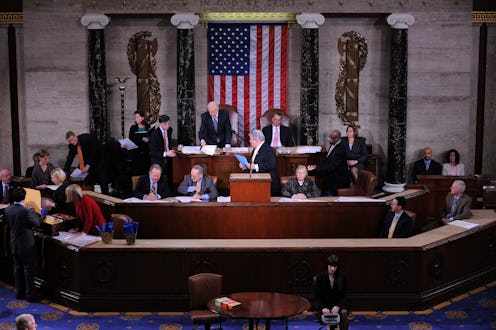News
The Automatic Plan Could Fix The Electoral College
Republican presidential candidate Donald Trump's claims that "the election is rigged" and his intimation that he would potentially not accept the results of the election if he doesn't win are potentially incredibly dangerous to the fabric of our democracy and should be swiftly denounced by leaders in both parties. They also remind the nation of an issue that has come center stage in this election: electoral reform. One alternative strategy that's gotten some traction is the automatic plan? Let's break it down — what is the automatic plan?
There are three main alternative voting systems that have gotten the most traction. The first is the district plan that says that each state should get two electoral votes to award a candidate based on the state's general popular vote and, additionally, dedicates one electoral vote to each congressional district in the state. Another is the proportional plan, which, sticking closest to the fundamentals of a direct popular vote, suggests that each state should have an electoral vote directly proportional to the popular vote that the candidate receives as recognized in the state. The third is the automatic plan.
The automatic plan, in many ways, cuts out the middleman and awards the state's vote to a particular candidate based on the popular vote of the state. Effectively, it removes the risk that electors would just cast their votes for whom they wanted, rather than what the state's vote reflected. To its champions, the automatic plan steers away from the pure popular vote and still has a buffer, since it follows a winner-take-all format. The candidate who gets the most popular votes will take all of the electoral votes for the state.
John F. Kennedy expressed a desire for election reform that sounds similar to the automatic plan. At a press conference in 1961, he said:
The area where I do think we perhaps could get some improvements would be in providing that the electors would be bound by the results of the State elections. I think that that would be a useful step forward. The electors, after all — the people vote, they assume the votes are going to be cast in the way which reflects the judgments of a majority of the people of the State. And therefore, I think it would be useful to have that automatic, and not set up this independent group who could vote for the candidate who carried the State or not, depending on their own personal views.
People on both sides of the aisle agree electoral reform might be a good idea, specifically calling out the arguably outdated role of the electoral college. Many prominent leaders, including former Democratic presidential nominee contender and Vermont Sen. Bernie Sanders, claim that the current system desperately needs change. “We are moving rapidly away from our democratic heritage into an oligarchic form of society where today we are experiencing a government of the billionaires, by the billionaires, and for the billionaires,” Sanders said in 2015, just a few months before he announced his presidential campaign.
But, what's the likelihood that the United States would adopt the automatic plan? Putting the automatic plan in place would mean passing a constitutional amendment, which in turn requires two-thirds of Congress to vote and agree on the decision and that decision needs to ratified by 38 of the 50 states — which is to say, especially with the current state of political polarization, the likelihood of any real change happening soon is slim.
